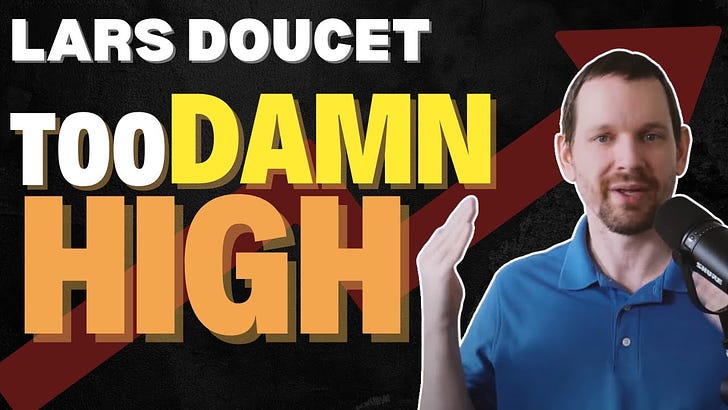A Serious Critique of Georgism
Lars Doucet, like almost all Georgists, is hopelessly naive. I love him, but that was the impression I got after listening to this interview with Dwarkesh Patel:
Now there are are many brilliant things in this interview, and it’s worth listening to in it’s entirety. But when asked whether it would undermine trust in the system to just seize everyone’s property rights, we got this gem of an answer:
Well, we’ve already violated all sorts of treaties…especially with the Indians
But let’s step back a bit to put this in context.
What is Georgism?
Georgism is the idea that you can and should fund the government by taxing the unimproved value of land (i.e., a land value tax — LVT).
There is a moral justification for this and an efficiency justification. The moral justification is that people didn’t create land itself and the value they get from it is literally rent-seeking.
The efficiency aspect is related to this: taxing unimproved land is more efficient than, say, taxing labor because if you tax labor people can work less. It creates what economists call deadweight loss. Taxing land won’t reduce the supply of land, so it is more efficient.
I am on board with the efficiency aspect, but the moral piece is bullshit. Land is just an asset like any other, and these days people buy all kinds of assets that provide income streams unrelated to their labor (e.g., stocks, bonds, etc). People work for money, they buy assets, and if they collect enough assets they don’t have to work anymore. To change this fundamental reality would require wholesale shift from capitalism, which is off the table. But anyway, the deadweight loss thing is for real.
Could it Work?
Yes and No. Yes in the sense that, as I just mentioned (and it’s worth repeating), an LVT is more efficient than income tax. Income taxes really suck, from a personal point of view and from an economic efficiency perspective. So to the extent an LVT could replace the income tax, that’s great. But could it?
Let’s just do a brief back-of-the envelope calculation here to find out. Let’s assume for a minute that we can convert all assets into two representations freely: the current value and the stream of income representation. That will make it a bit easier to compare the value of land to the value of taxes.
We do have some data about land values. This random link here says that all the real estate in the US is worth about $35 trillion, and the unimproved portion of that is about $10 trillion. I’ve heard estimates more and less than that but let’s run with it for a moment.
How much are taxes worth? Well, the US collects about $4 trillion in taxes each year (mostly income taxes of one form or another). If we convert that to a present value (using a 4% interest rate), it would be worth about $100 trillion.
These numbers are far from perfect, but you get the picture. According to my rough estimates the LVT is about an order of magnitude too small to ever replace the income tax system we currently have.
Even if LVT were big enough, the question of how to transition from an income tax regime to an LVT is critical, essential…I can’t emphasize enough how important this is and Lars basically makes some vague gestures saying that landowners should receive some compensation and then says, well, we took away all the land from the Indians and that was fine! That is simply not taking this issue seriously enough.
Can we Fix It?
But income taxes are so bad that I am not ready to let Georgism go. Can we fix it?
First, let’s address the size issue. Land is simply not a big enough asset class to replace the value the government gets from taxes. Luckily, there are lots of asset classes! What about corporate ownership? Natural resources? Intellectual property?
If we were economists worth our salt, we would rank every single asset class and come up with an estimate of how bad they are in terms of distorting the economy. Income taxes are just about the worst asset the government can control. We can do better with virtually any other asset! So why don’t we?
Even if land can’t replace the whole government portfolio, it could be a part of a portfolio that looks a hell of a lot better than the current one. Even if Georgism can’t be the whole answer, it can be part of the solution.
So now suppose our economists have done their jobs and we found the least distortionary portfolio of assets that the government could own that could still provide the necessary revenue. The hard question still remains.
In addition to the idea that we just steal the land like we did from the Indians, Lars provides a somewhat more rational suggestion: just raise property taxes on unimproved land while reducing them on improvements to land (i.e., buildings). Unfortunately, this is answer is completely inadequate. It still creates huge classes of winners (people who own mostly buildings) and losers (people who own mostly unimproved land).
Luckily, there is a much better solution. It just requires a bit more creativity.
A Real Solution to the Transition Problem
So here’s what you were waiting for, the solution to the biggest problem with Georgism. Buckle your seat belts!
The Government should just buy all the land (and other assets it wants) and fund the purchase by selling income taxes.
In other words, all the assets we need are basically there in one form or another. Just doa swap using regular market methods. But how, you ask, does the government sell income taxes??
First of all, we should admit up front two big problems with government selling it’s income tax asset portfolio. The first problem is that it’s not just the government owning income taxes that is a problem. Virtually anyone owning the income stream of another person creates the same inefficiency problem. If I had to pay taxes to some hedge fund, it would be just as bad as paying them to the government. The asset class itself is rotten!
Luckily there are two exceptions to this: individual people can own their own income just fine, and corporations can own the income of their employees. They already have an apparatus for dealing with labor incentives, and we basically have already sold the value of our work to our employers anyway. So if we can just sell people’s income taxes back to them (or their employers…and create a kind of income transfer market like the Champions League) we can make the deal happen.
The other issue is that if the government starts selling income taxes it will create a market for lemons. The average individual income tax package might cost something like $1 million. But people aren’t equal. Individuals (and their employers) have much more information about their future labor than the government does. So people who aren’t going to earn much in the future will be happy to owe taxes, and the people who are worth a lot in the future will be more than happy to buy their own tax obligations back for a measly million bucks.
But there are solutions for this, too! The government just has to make the deals happen in bulk. People (or employers) just have to buy their income taxes back in groups large enough that the government can run statistics and come up with a decent valuation that will make sense.
It might even make sense to allow states or municipalities or some other entities to get in the game. Maybe the US could even create some special economic zones where if the population get’s above a certain amount the citizens of that zone are not subject to income taxes and the zone government will pay the US government for this right. Interestingly, residents of Puerto Rico already don’t pay federal income taxes and their government doesn’t even have to pay off the USG!
Bottom line is that the only real way the US government can wean itself off income taxes is if it replaces them with a significantly large portfolio of other assets. And the least disruptive way of making this transition is to simply do it through some market transactions. We might even come up with some clever auction method to deal with the information imbalance (like allowing certain other entities to bid on the right to your income taxes). But in principle it is possible to overcome all of these problems — at least it should be possible to do something better than the current, terribly inefficient income tax regime.
Long Live Georgism!




